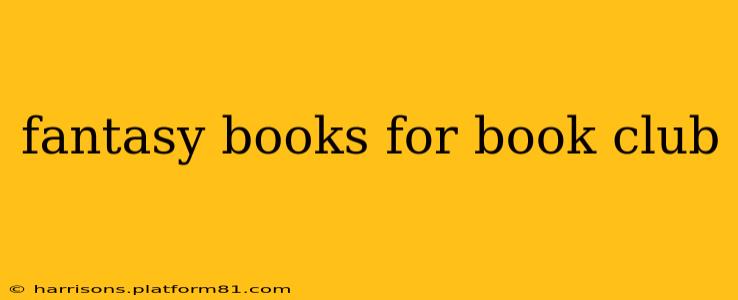Choosing the right fantasy novel for your book club can be a magical—or, sometimes, monstrous—task. The genre offers a vast landscape of high fantasy epics, gritty urban adventures, and everything in between. This guide helps you pick a book that sparks lively discussions and leaves everyone wanting more. We'll delve into various subgenres, consider different reading levels, and even tackle some common book club concerns.
What Makes a Great Fantasy Book Club Pick?
The perfect fantasy novel for a book club needs more than just dragons and magic. It should:
- Offer Engaging Characters: Readers need to connect with the protagonists and antagonists, experiencing their journeys and understanding their motivations. Compelling characters lead to richer discussions.
- Present a Compelling Plot: A well-structured plot with twists, turns, and satisfying resolutions is crucial. A slow burn can work, but it needs a strong hook to keep readers engaged.
- Provide Room for Interpretation: The best fantasy leaves room for diverse interpretations of themes, symbolism, and character actions. This fuels engaging conversations.
- Be Appropriately Challenging (but not overwhelming): Choose a book that matches your book club's reading level and experience with the genre. Don't shy away from complexity, but don't choose something so dense it discourages participation.
Subgenres to Consider for Your Fantasy Book Club
The fantasy genre is diverse; here are a few subgenres to inspire your next selection:
High Fantasy:
- Epic Scope: These stories often involve vast worlds, intricate histories, and large casts of characters. Think The Lord of the Rings (classic, but still a powerful choice) or The Stormlight Archive by Brandon Sanderson (a more modern, complex epic). These are great for clubs who enjoy detailed world-building and sprawling narratives.
Low Fantasy:
- Mundane Worlds: These stories often blend fantasy elements into our own world or a world very similar to it. Jonathan Strange & Mr Norrell by Susanna Clarke offers a unique blend of history and magic, making it a compelling choice.
Urban Fantasy:
- Modern Settings: These novels combine urban settings with fantasy elements, creating unique and often gritty stories. Rivers of London by Ben Aaronovitch is a fun, accessible entry point for this subgenre.
Grimdark Fantasy:
- Dark Themes: This subgenre explores darker themes and morally gray characters. The First Law trilogy by Joe Abercrombie is a good example, but be warned, it's not for the faint of heart!
Addressing Common Book Club Concerns
What if members have different reading levels or experience with fantasy?
Choose a book with a clear and engaging writing style. Consider starting with a shorter novel or one with a simpler plot if your group is new to fantasy.
How do we manage lengthy discussions on complex books?
Prepare discussion questions in advance, focusing on specific themes, characters, or plot points. Break down larger discussions into smaller, more manageable segments.
What if some members finish the book early or late?
Establish ground rules about spoilers and encourage everyone to contribute what they can, regardless of their reading pace.
Suggestions for Your Next Fantasy Book Club Meeting:
- For beginners: Sabriel by Garth Nix (first in the Old Kingdom trilogy) – a solid YA entry into the fantasy genre.
- For experienced readers: The Name of the Wind by Patrick Rothfuss (first in The Kingkiller Chronicle) – a captivating story with rich prose.
- For something different: The Goblin Emperor by Katherine Addison – a heartwarming and unique take on high fantasy.
Ultimately, the best fantasy book for your book club depends on your group's preferences and reading styles. Don't be afraid to experiment and explore the vast and wondrous world of fantasy literature! Happy reading!
